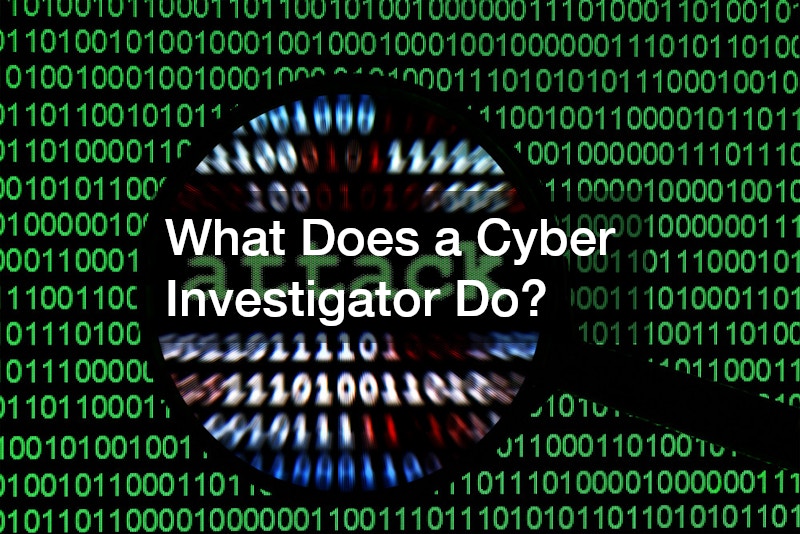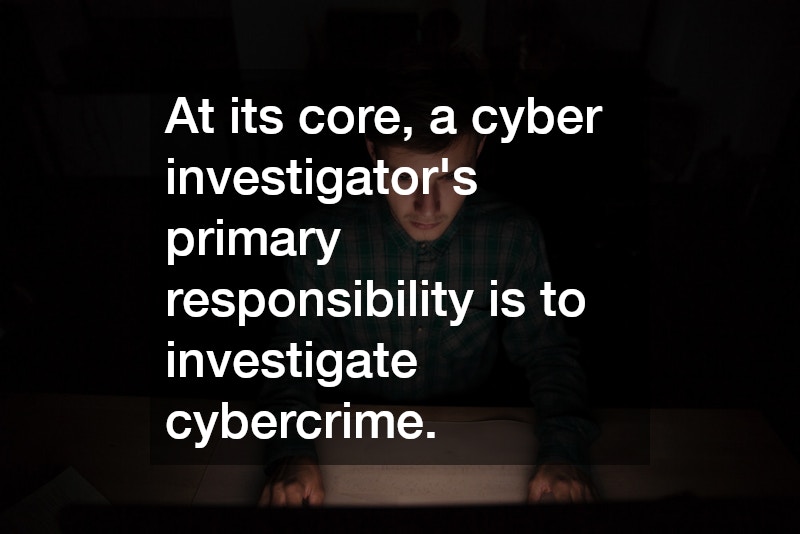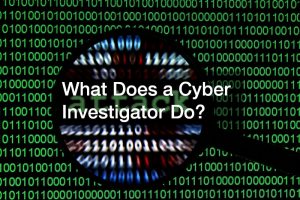
In today’s digital age, cybercrime is on the rise, and with it, the need for highly skilled professionals who can investigate and solve these crimes. One of the key players in this arena is the cyber investigator. A cyber investigator specializes in tracking and analyzing digital crimes, ranging from hacking and identity theft to corporate espionage and online fraud. If you’re curious about what a cyber investigator does and how private cyber investigator services can help businesses and individuals, this guide will walk you through their role and responsibilities.
1. Investigating Cybercrime
At its core, a cyber investigator’s primary responsibility is to investigate cybercrime. These crimes can include a wide range of activities, such as unauthorized access to systems, data breaches, phishing attacks, ransomware, and identity theft.
Cyber investigators are trained to trace the origin of these attacks, identify the perpetrators, and collect digital evidence that can be used in court.
One of the tools that cyber investigators use is forensic analysis. By analyzing digital footprints left behind on devices, servers, and networks, they can uncover valuable information about how a crime was committed and who was responsible. This involves examining logs, metadata, IP addresses, emails, and even deleted files. For individuals or businesses impacted by a cyberattack, hiring private cyber investigator services can help track down the root cause of the incident and provide vital evidence for legal or insurance purposes.
2. Digital Forensics
Digital forensics is a critical component of a cyber investigator’s job. This process involves collecting, preserving, analyzing, and presenting digital evidence in a way that is admissible in court. Cyber investigators often work closely with law enforcement agencies, attorneys, and businesses to retrieve and analyze digital evidence.
Digital forensics can be performed on a wide range of devices, including computers, mobile phones, tablets, and even servers. Investigators might recover data from damaged devices, analyze chat logs, recover deleted messages, or investigate suspicious emails. The goal is to build a clear picture of what happened during the cyber incident and how the perpetrator carried out their attack.
For businesses, private cyber investigator services can be invaluable in cases where proprietary information has been stolen or sensitive data compromised. Cyber investigators can often recover data, assess the extent of the damage, and provide guidance on preventing future attacks.
3. Identifying Threats and Vulnerabilities
A significant part of a cyber investigator’s job is identifying vulnerabilities in systems before an attack takes place. This proactive approach helps businesses and individuals secure their data and reduce the risk of a cyberattack. Cyber investigators conduct vulnerability assessments, penetration testing, and security audits to find weak spots in a company’s network or system infrastructure.
During a vulnerability assessment, cyber investigators evaluate the security measures in place and test them against known threats. They might run simulations of potential attacks to see how well a system can defend itself. By pinpointing weaknesses, investigators can help businesses strengthen their defenses, preventing hackers from exploiting vulnerabilities in the future.
Hiring private cyber investigator services for routine security audits is an effective way for businesses to stay ahead of cybercriminals and protect their assets.
4. Tracking Cybercriminals
One of the most challenging aspects of cyber investigation is tracking down cybercriminals. Cyber investigators use a variety of tools and techniques to follow the digital trail left by hackers, fraudsters, and other malicious actors. This can involve tracing IP addresses, monitoring suspicious network activity, or using social engineering tactics to uncover the identity of the perpetrator.
Cyber investigators often work across borders, as cybercriminals tend to operate in different countries from their targets. This requires a deep understanding of international laws, digital privacy regulations, and cooperation with law enforcement agencies globally. Through these efforts, private cyber investigator services help bring cybercriminals to justice, no matter where they are located.
5. Recovering Stolen Data
In cases where data has been stolen or compromised, cyber investigators play a crucial role in attempting to recover the lost information. Whether it’s recovering encrypted files from ransomware attacks or retrieving deleted data from a breached system, cyber investigators work tirelessly to help businesses and individuals regain control of their digital assets.
For example, in ransomware cases, cyber investigators might help negotiate with attackers, analyze the malware used, or find ways to bypass the encryption to retrieve important files. In cases of corporate espionage, they can track down who accessed sensitive information and how it was stolen.
Utilizing private cyber investigator services ensures that you have experts on your side who are experienced in handling these high-stakes situations and can help recover what was lost.
By employing private cyber investigator services, businesses and individuals can ensure that they are well-protected from cybercrime, with experts who can not only respond to incidents but also help prevent future attacks. Whether you’re dealing with a data breach, identity theft, or corporate espionage, a professional cyber investigator can provide the expertise needed to secure your digital assets and bring cybercriminals to justice.
.






